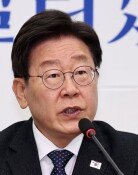Strong won continues, affecting Korean exporters
Strong won continues, affecting Korean exporters
Posted October. 16, 2013 06:39,
Delayed quantitative easing in the U.S. and foreign investors buying spree in the Korean stock market are strengthening the Korean won, lowering the exchange rate to 1,060 won against the dollar in about nine months.
The Seoul FX market closed Tuesday with the won/dollar exchange rate at 1066.8 won, down 4.7 won from the previous day and the lowest since Jan. 23 with 1066.2 won, affected by the news that U.S. negotiations over increasing the governments debt ceiling came to finalization. As the New York stock market started strong on Monday, the KOSPI renewed its record high for the year and the won/dollar exchange rate went down.
The exchange rate that immediately surged to 1154.7 won in June when FED Chairman Ben Bernanke announced an exit from the monetary stimulus within this year is now continuously decreasing. Multiple reasons account for this change.
In a short term, the FEDs postponing the withdrawal of its monetary stimulus weakens the U.S. dollar against other major currencies. More directly, foreigners bought stock worth over eight trillion won for the last one month, accelerating the influx of foreign capital into the Korean stock market. Foreign buying has continued for 33 consecutive days until Tuesday, just one day away from breaking the longest net buying.
Internal factors like surplus in current account balance for 19 consecutive months added a momentum to the strong won. Koreas accumulated current account surplus from Jan. to Aug. reached 42.28 billion won. The Bank of Korea forecast that at the current pace the surplus will exceed the annual record of 63 billion one. As the Chinese economic indicators improve, concerns over a Chinese economic slowdown have also been somewhat alleviated.
Analysts predict that the strong won will continue due to delayed exit from quantitative easing in the U.S. and high chance of soft landing in China. Whether Japan will increase its consumption tax next month or not is also a variable. Since the Japanese central bank has already suggested that it would conduct additional quantitative easing in case of increase, the won can get stronger backed by the weak yen.
The recent trend of strong won is considered a positive signal for Korea because it a reflection of the fact that Koreas economic fundamentals are stronger than those of other emerging countries. However, if this goes excessive, it can obstruct the nations economic recovery because the strong won increases the prices of made-in-Korea products and accordingly lowers their competitiveness in global markets.







